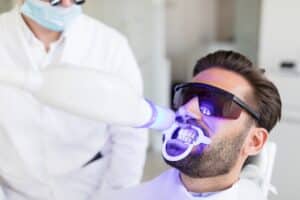The temporomandibular joint is often the cause of pain in the face. The temporomandibular joint connects your upper and lower jaw bones and works like a hinge. Face and jaw pain can be unbearable, even worse when you don’t know what’s wrong. If this joint isn’t working right, it could indicate that you have TMJ or common temporomandibular disorder.
This complex joint comprises muscles, ligaments, discs, and bones that move your jaw forward, backward, and side to side. If something is wrong with your jaw joint, it can hurt and make it hard to move your jaw—understanding TMJ and determining what treatment you’ll need help decide what symptoms to look for.
The signs of TMJ-related disorder
If you have any of the following symptoms, you may have a problem with your temporomandibular joint:
- Your jaw joint hurts or is sore.
- You have neck or shoulder pain.
- Your face hurts
- The side of your face swells up
- Pain in your ear or around it
- Having pain while chewing or a bad bite
- Toothaches
- Headaches
- Dizziness
- Trouble hearing or a ringing in the ears (tinnitus)
It’s hard to open or close your mouth because your jaw is locked. When you open and close your mouth, you feel like something is clicking or grating.
What Could Go Wrong and Why?
The signs of temporomandibular joint and nerve pain are usually easy to spot. Still, it’s harder to figure out what’s causing your pain. Your doctor or dentist might be unable to determine why your TMJ hurts. But a TMJ disorder can happen if any of the following things happen:
- Joint cartilage that has been hurt by arthritis
- Jaw disc wear and tear
- A broken jaw caused by whiplash or a hard blow
- Clenching or grinding your teeth (chronic)
- Stress or worry that makes you clench your jaw and face muscles
- Poor posture
- Braces for teeth
- Use of chewing gum too much
- There are diseases of the connective tissue that affect your temporomandibular joint.
Diagnosing the temporomandibular joint disorder
Most of the time, your dentist in Keller is one of the first to notice or diagnose a TMJ disorder. TMJ can be diagnosed and treated by your family doctor, an ENT (ear, nose, and throat) specialist, or an oral surgeon. Most of the time, your doctor will check your jaw joints to see if they hurt or feel sore. They will also check your jaw movement and facial muscles and listen for any clicking or grating sounds when you move your jaw. Your doctor may also use X-rays or other tests like a CAT scan or MRI to rule out other problems and get a complete picture of what’s going on in your face.
There are ways to treat TMJ Related disorders
There are many ways to treat TMJ. Home care can be your first line of defense. But if you’ve tried everything you can at home to help your jaw, you may need to see a doctor for more care.
Treatment At Home
If you know how to take care of your temporomandibular disorder and do it, you may feel better and get better. At residence, you could do the following:
- Eat something soft. Load up on foods that don’t need to be chewed and avoid things like thick sandwiches that need wide bites.
- Take an anti-inflammatory medicine like ibuprofen or naproxen that you can buy without a prescription.
- Keep your back straight, and don’t rest your chin on your hand.
- Don’t move your jaw too much or for no reason. Don’t chew gum, put your hand under your chin when you yawn and don’t do things like sing or yell that could make your jaw open too much.
- Set your jaw as often as possible, so your teeth are a little apart. If you have trouble not grinding or clenching your teeth, put your tongue in between your teeth.
- For about 10 minutes, put moist hot or cold packs on your jaw and the side of your face. This is something you can do many times a day.
Learn to calm down
You’ll need a few ways to deal with stress if you want to calm down and stop clenching your teeth. You might want to ask your doctor or dentist how physical therapy can help. Give yourself a massage of your neck and jaw. Ask your doctor or physical therapist about gentle stretches you can do at home if that is the right thing.
Medical treatment
See a doctor if you have constant pain and tenderness in your jaw or if you can’t open and close your mouth. Our Dentists in abc123 Dental in Keller, TX, may suggest certain medications like pain relievers, muscle relaxers, and drugs that fight inflammation.
Mouth guards or oral splints
These oral devices can be soft or hard, and they usually slip over your teeth to help keep your jaw in place.
Therapy for the body
A physical therapist can show you how to stretch and massage your jaw to make it more robust and flexible. They can also do ultrasounds and look at your habits to see if any of them are making your TMJ worse.
Options for surgery
If other ways of treating your pain don’t work, our dentist in Keller, TX may suggest surgery or another procedure. Some of these are open joint surgery, arthrocentesis, injections in the joint, and TMJ arthroscopy. These procedures range from those that don’t hurt the body to those that do.
Visit abc123 Dental in Keller, TX, for more information on TMJ-related treatment.





